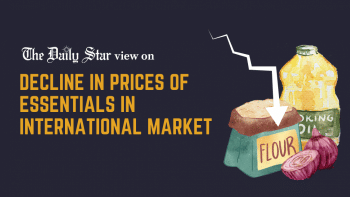Govt ineptitude fuelling inflation

It is unacceptable that the government has failed to deliver to Bangladeshi consumers the benefits of a fall in the prices of food items on the international market. At a programme on March 27, the Centre for Policy Dialogue (CPD) observed that prices of essentials are on the rise in the domestic market compared to those in overseas markets due to market manipulation by a group of businesses and absence of internal governance. It is something that the media has previously reported on, and that we have also mentioned in this column.
According to the commerce ministry's own data, the price of soybean oil has dropped by 39 percent in the international market over the past year but has increased by more than 10 percent in the country during the same period. Prices of other imported items such as palm oil and red lentils have also dropped substantially on the global market, but the benefits of that drop have not reached local consumers. A number of other essential items such as rice, sugar, and beef, according to the CPD, are more expensive in Bangladesh than in other developing countries. As a result, many families, including minimum wage earners across all sectors, are struggling to meet their needs. Some have even been forced to exclude meat and fish from their diets altogether.
According to the commerce ministry's own data, the price of soybean oil has dropped by 39 percent in the international market over the past year but has increased by more than 10 percent in the country during the same period.
Researchers at the CPD revealed that the average monthly food expense for a family of four is now about Tk 22,664, which was Tk 18,115 a year ago. The fact that traders waste no time to raise prices of essentials when their prices go up in the international market, but are unwilling to compromise on any profits whatsoever at a time when the majority of the population is struggling due to exorbitantly high prices, should be urgently addressed. Government agencies themselves have a tendency of doing the same in regards to energy prices, which of course adds to the inflationary pressure by pushing up the prices of everything – while providing no respite to consumers when global prices eventually drop.
Market distortions by a small number of dominant firms and lax regulations are the major problems facing our markets. The government has to ensure that these influential traders are not manipulating prices to make exorbitant profits. In that regard, the government needs to revise the existing laws that regulate competition of essentials in the market.
According to the CPD, the tax burden on at least 28 imported essential food items is now quite high. The government needs to reduce import duties and VAT to bolster supply and meet current domestic demand. It has to realise that prices have surpassed the purchasing capacity of the majority of Bangladeshi consumers and that it must intervene effectively in the market.


 For all latest news, follow The Daily Star's Google News channel.
For all latest news, follow The Daily Star's Google News channel. 









Comments